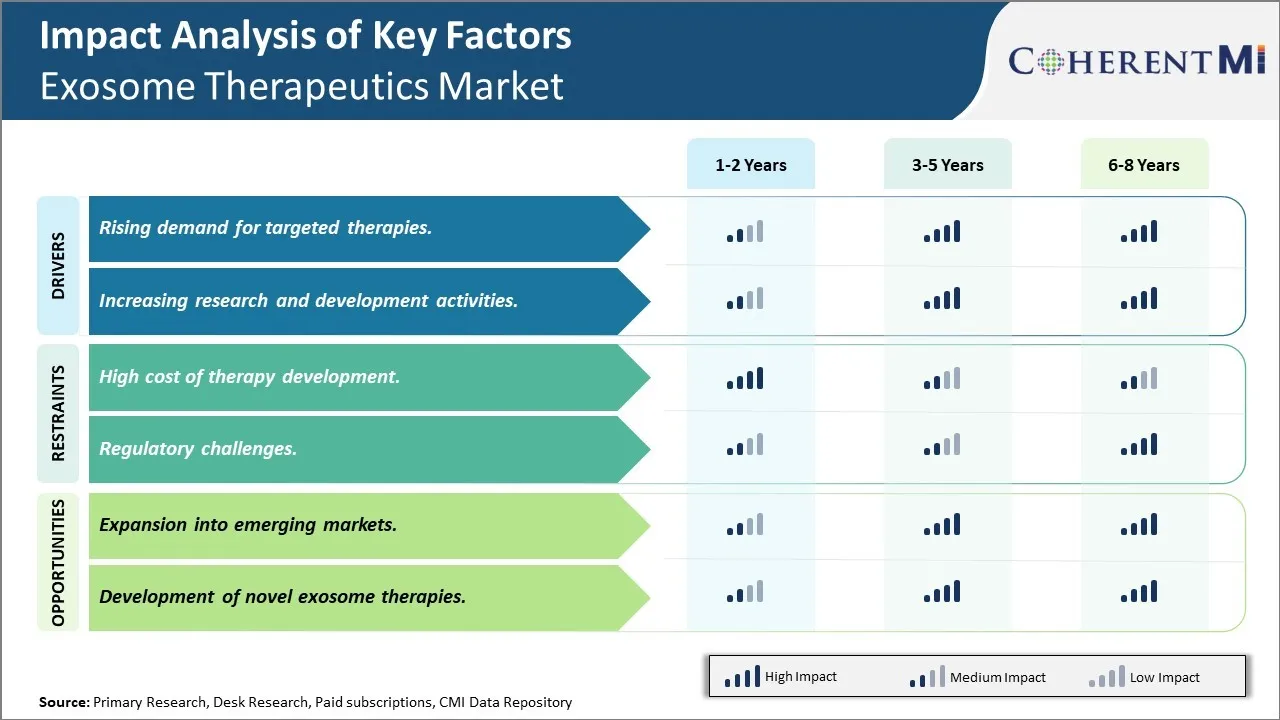Exosome Therapeutics Market Trends
Market Driver - Rising demand for targeted therapies
The therapeutic arena has seen a tremendous evolution over the past few decades. Where earlier therapies targeted diseases in a broad manner, the recent focus has been on developing precision medicines that address the core pathways driving a disease. Exosomes being extracellular vesicles that aid intercellular communication, researchers have been actively exploring their potential to be utilized as targeted therapies, specifically for conditions where conventional drugs have limitations.
Many chronic and life-threatening conditions such as cancer continue to remain major challenges given tumors ability to evolve resistance. With exosomes playing a role in modulating the tumor microenvironment, engineering their content promises opportunities to influence molecular mechanisms in a focused way. Several studies have demonstrated how exosomes can be tailored to carry anti-cancer drugs, immunomodulators or even tumor-suppressive nucleic acids directly into tumors or engage with immune cells. This helps achieve better drug concentrations at disease sites while reducing systemic toxicity. Their endogenous nature also enables repeated administration with lower immunogenicity concerns compared to other nanocarriers.
For conditions where the exact disease-causing changes are not fully clear, exosomes open possibilities for personalized profiling approaches. Scientists are learning to analyze a patient's bodily fluid exosomes to glean molecular signatures reflective of their disease state. This detailed information can then guide selection of optimal exosome therapies best suited to counter observed aberrations. Several startup companies are collaborating with clinical organizations to validate such strategies, hoping to eventually support precision care approaches.
As alternatives are explored for conditions not adequately addressed through available standard of care options, the appeal of targeted exosome therapies with their versatility is growing. More patient-focused research continues to shed light on their advantages, driving hope that they represent a new class of customizable medicines for the future.
Market Driver - Increasing research and development activities
Strengthened by the successes seen so far in validating exosome's therapeutic potential, research in this domain has intensified significantly. Both private business entities as well as academic institutions worldwide are investing heavily to unravel multifaceted exosome biology and apply it for clinical benefit. Several biotech startups have been established solely with the vision of engineering exosome therapeutics. Their innovative work involves devising methods for large-scale exosome isolation, loading diverse molecular cargoes, surface engineering for targeting capabilities and establishing safety, pharmacokinetic and dosing benchmarks.
Alongside, many pharma companies are acknowledging exosomes as a major area warranting their participation. A few have formed strategic collaborations or taken over startups to gain access to their unique technology platforms. The scope now expands beyond cancers to domains including neurodegeneration, cardiovascular, metabolic and infectious diseases. Multiple phase I/II investigations are evaluating exosome therapies across various clinical indications. Regulatory authorities too have recognized their potential as a new drug class, and are actively engaging with the R&D community members to provide necessary guidelines.
Academic centers globally are significantly participating in basic as well as preclinical exosome sciences, and in implementing industrial partnerships for product development. Large government funding is spurring exciting multi-institutional projects. International conferences focusing on exosome therapeutics witness tremendous participation with many new findings being presented each time. The literature base on their therapeutic use expands by thousands of publications annually. Leveraging this reinvigorated energy, the field seems well poised to see multiple exosome candidates advance into late-stage clinical development in the next 5 years. Such progress reflects the ever-growing commitment of stakeholders towards realizing the full promise of exosome-based medicines.

Market Challenge - High cost of therapy development
One of the major challenges currently being faced by players in the exosome therapeutics market is the extremely high cost associated with research and development of new therapies. Developing an exosome-based drug requires extensive laboratory research to first isolate exosomes from donor cells, optimize purification techniques, examine their cargo and functional properties, and engineer them for precise therapeutic applications. This is followed by rigorous pre-clinical testing on animal models to analyze treatment efficacy, safety, and assess biological interactions. If successful, multiple phases of clinical trials in human patients are then required to obtain regulatory approvals. Each stage takes years to complete and requires massive investments running into hundreds of millions of dollars. The financial risks are further amplified by the low probability of a candidate making it from the lab to the market. While the scientific premise is promising, high R&D costs pose significant barriers to entry for new players and limit investments towards innovative programs.
Market Opportunity - Expansion into emerging markets
One major opportunity for companies in the exosome therapeutics market lies in expanding into emerging economies. While current clinical research and approvals are focused on the large markets of North America and Europe, several developing Asian, African, and Latin American countries present a huge patient population and commercialization potential. Exosome therapies have the promise to address multiple diseases with high unmet needs in these regions such as cancers, cardiovascular diseases, neurological disorders, and inflammatory conditions. Partnering with local diagnostic players, healthcare providers, and governments offers an efficient route for market penetration. In the future, as more clinical data is generated and manufacturing capabilities improve, select exosome-based products may receive approvals more quickly in emerging nations where healthcare budgets are limited. This could allow companies to generate early commercial revenues, expand globally and improve access to novel therapies worldwide.